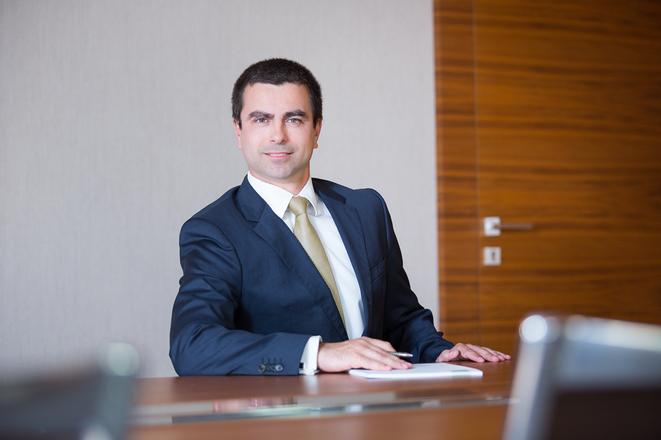1. Your law firm has been operating on the market for only 5 years and yet it is one of the biggest in Slovakia. Is there any particular pattern or guide to how to achieve such a goal?
It is a result of planning well in advance. When the firm was established, we had sufficient clientele to enable us to provide top quality legal services and not struggle to survive. Therefore, from the very beginning we could set our ambitions high while simultaneously focusing on growth.
In the past five years, our law firm has been increasing its agenda at a rate of approximately 30 % p.a.. To achieve such a rate, you must have a clear recognition of your aims and the means to make them happen. The rest is just the outcome of hard work, determination and confidence.
2. Have you achieved the growth of your law firm as you planned?
At the present time we are approximately where we planned to be. Our plans are, understandably, not just about today, but are focused on the long term, and I am confident that the planned growth of our firm will yet continue. At the establishment of the firm, the total number of lawyers was 13; presently it is 25. I believe that in order to fulfill our clients’ needs, this number will have to increase to 30 by the end of 2016, as at the moment, we are limited in accepting new matters by the number of lawyers in our team.
3. From your statements I have understood you link quality to big law firms. Do you consider big law firms as automatically more capable of providing law services of better quality?
Absolutely not. To the contrary, I hold the view that there are many attorneys-at-law, based on a “one man show principle”, who are not interested in building something bigger and yet offering an excellent level of quality. However, such an approach has its limits - the capacity of those individuals. There are only so many hours in a day, and there are substantial areas of legal services which simply cannot be covered by any one person in that way. We have chosen the path of providing services to large corporations who requirement a scope of the work that cannot be plausibly offered by small law firms. I personally believe that the future belongs to big law firms able to put together a broad team of experts covering various agendas and providing thousands of hours monthly while simultaneously maintaining an excellent standard of quality. Thus, to answer your question, I do not think that a big firm automatically means higher quality. On the other hand, I believe that bigger firms grow from smaller ones as a result of providing the desired level of quality. It is more difficult to sustain such quality with persistent growth, requiring intensive management of work and the systems of output control.
4. Which areas of legal services are considered as the most important from the point of view of your firm’s activity and which are your most prominent clients?
RELEVANS largely focuses on the areas of litigation, competition law, mergers & acquisitions and real-estate law. Among the most prominent of our clients who have given permission to be named are Eurovea, a.s., ČEZ Slovensko, s.r.o., Železničná spoločnosť Slovensko, a.s., Železničná spoločnosť Cargo Slovakia, a.s., Rozhlas a televízia Slovenska, Akzent BigBoard, a.s., J&T FINANCE GROUP SE, and J&T REAL ESTATE, a.s.. We endeavour to provide each and every client with the same highest quality legal services.
5. Can you name the biggest projects you deal with in one selected area of law where you provide services?
I consider the field of litigation as the area in which we are the strongest and which we can easily distinguish our abilities. We are currently representing clients in more than 160 major lawsuits, as both plaintiffs and defendants. We primarily focus on representing big corporations in breach of contract or violation of law proceedings where civil damages are sought. Among our most significant lawsuits, from perspective of the amount claimed, would include our representation of Medical Care Holding in its suit against the Slovak Republic, a case regarding the demand of more than 30 million euros in damages as the result of a profit ban imposed on shareholders of private health insurance companies (in this particular case, the bankrupt Európska zdravotná poisťovňa, a.s.). Regarding lawsuits where we represent the defendant, among the most significant we rank representation of defendants Železničná spoločnosť Cargo Slovakia, a.s. and Železničná spoločnosť Slovensko, a.s., which are being sued for damages in an amount exceeding 50 million euros.
6. It is interesting you pointed out two lawsuits – one where you represent a subject claiming damages against the state and one where you defend the state. Do you not find this to be a conflict of interests?
Not at all, and I picked those two on purpose. I strongly feel that a favourable outcome in court should never be prejudged according to who the parties to the proceedings are. When we are preferred by clients from various spectrums, we are very delighted and consider it as recognition of the quality work we do.
7. We have noticed an article about a case you are dealing with, where the judge was excluded from deciding the case for being biased. When is a judge considered to be biased under Slovak law?
The assessment of the bias of a judge has its objective and subjective elements. The objective element requires that to prevail with objections concerning a judge's prejudice, you have to prove certain objective facts about the judge’s relations to a party to the proceedings, the party’s legal counsel, or concerning the object of the proceedings specifically. Once the objective factors are considered, the subjective element emerges, which is simply the assessment of whether or not the established facts are capable of diminishing the credibility of a judge in the eyes of the public. Even a plain challenge might be sufficient to exclude a judge from the proceedings. A judge’s bias may not be apparent in every act. Additionally, to require a party alleging bias to actually show some proof of actual wrongdoing, to catch the judge “with a smoking gun in hand”, would be to set an unachievable standard. Such an absurdly high burden of proof is considered as inadequate in all civilised countries, and does nothing to alleviate public scepticism about the fairness of the courts.
8. To conclude, could you, please, tell us your opinion of the judiciary and its quality in the Slovak Republic?
The Slovak judiciary has overcome significant challenges in the last 20 years, with the fundamental principles of civil litigation having changed and those changes still continuing. As an optimist, I note that judicial proceedings have been accelerated significantly and the quality of judicial decisions has similarly improved. We have progressed from the system of deciding cases on the basis of the principle of material truth to partially contradictory judicial proceedings and an incomplete appellate system. The abovementioned enhance the chance of realising justice more promptly. The civil procedure system and rules are gradually gaining strength and a further major step, a new litigation code, is coming into force on July 1, 2016. To me, it is more important where we are heading, not the state we are in now. Therefore, I appreciate and anticipate the further development in the Slovak judiciary.

 JUDr. Alexander Kadela, managing partner (source: RELEVANS)
JUDr. Alexander Kadela, managing partner (source: RELEVANS)
 (source: RELEVANS)
(source: RELEVANS)